the introduction of positive psychology(积极心理学的简单介绍)
- 格式:doc
- 大小:27.50 KB
- 文档页数:1
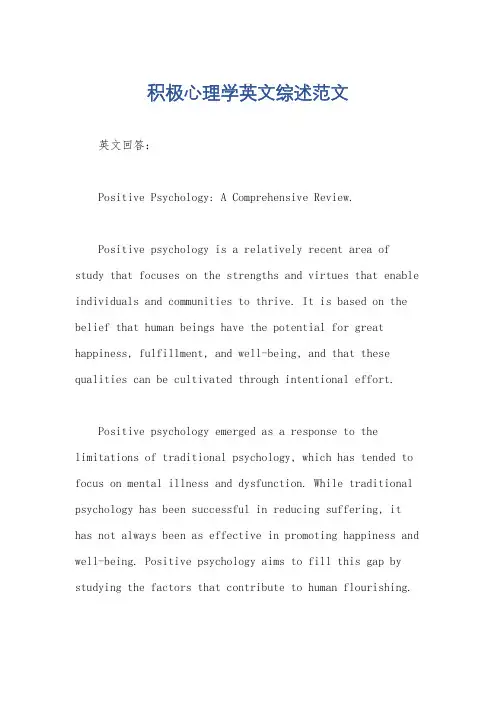
积极心理学英文综述范文英文回答:Positive Psychology: A Comprehensive Review.Positive psychology is a relatively recent area of study that focuses on the strengths and virtues that enable individuals and communities to thrive. It is based on the belief that human beings have the potential for great happiness, fulfillment, and well-being, and that these qualities can be cultivated through intentional effort.Positive psychology emerged as a response to the limitations of traditional psychology, which has tended to focus on mental illness and dysfunction. While traditional psychology has been successful in reducing suffering, it has not always been as effective in promoting happiness and well-being. Positive psychology aims to fill this gap by studying the factors that contribute to human flourishing.One of the key tenets of positive psychology is that happiness is not simply the absence of negative emotions, but rather a positive state of being that is characterized by feelings of joy, contentment, and fulfillment. Positive psychologists believe that happiness can be cultivated through a variety of activities, such as spending time with loved ones, engaging in meaningful work, and practicing gratitude.Another key tenet of positive psychology is that resilience is a key factor in well-being. Resilience is the ability to bounce back from adversity and to maintain a positive outlook in the face of challenges. Positive psychologists believe that resilience can be learned and strengthened through a variety of techniques, such as mindfulness, positive self-talk, and social support.Positive psychology has a number of applications in the real world. For example, positive psychology interventions have been shown to be effective in reducing stress, improving mood, and increasing resilience. Positive psychology has also been used to develop programs thatpromote well-being in schools, workplaces, and communities.Positive psychology is a growing field of study that has the potential to make a significant contribution to our understanding of human well-being. By focusing on the strengths and virtues that enable individuals and communities to thrive, positive psychology can help us to create a more fulfilling and meaningful world.中文回答:积极心理学,全面综述。
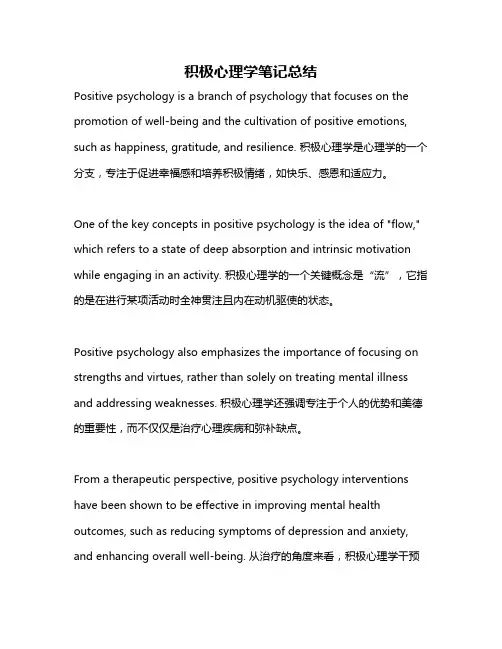
积极心理学笔记总结Positive psychology is a branch of psychology that focuses on the promotion of well-being and the cultivation of positive emotions, such as happiness, gratitude, and resilience. 积极心理学是心理学的一个分支,专注于促进幸福感和培养积极情绪,如快乐、感恩和适应力。
One of the key concepts in positive psychology is the idea of "flow," which refers to a state of deep absorption and intrinsic motivation while engaging in an activity. 积极心理学的一个关键概念是“流”,它指的是在进行某项活动时全神贯注且内在动机驱使的状态。
Positive psychology also emphasizes the importance of focusing on strengths and virtues, rather than solely on treating mental illness and addressing weaknesses. 积极心理学还强调专注于个人的优势和美德的重要性,而不仅仅是治疗心理疾病和弥补缺点。
From a therapeutic perspective, positive psychology interventions have been shown to be effective in improving mental health outcomes, such as reducing symptoms of depression and anxiety, and enhancing overall well-being. 从治疗的角度来看,积极心理学干预已被证明可以有效改善心理健康结果,如减少抑郁和焦虑症状,提高整体幸福感。
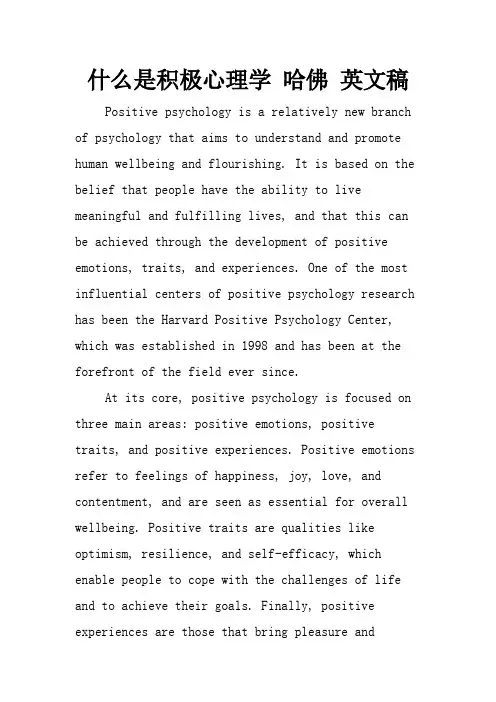
什么是积极心理学哈佛英文稿Positive psychology is a relatively new branch of psychology that aims to understand and promote human wellbeing and flourishing. It is based on the belief that people have the ability to live meaningful and fulfilling lives, and that this can be achieved through the development of positive emotions, traits, and experiences. One of the most influential centers of positive psychology research has been the Harvard Positive Psychology Center, which was established in 1998 and has been at the forefront of the field ever since.At its core, positive psychology is focused on three main areas: positive emotions, positive traits, and positive experiences. Positive emotions refer to feelings of happiness, joy, love, and contentment, and are seen as essential for overall wellbeing. Positive traits are qualities like optimism, resilience, and self-efficacy, which enable people to cope with the challenges of life and to achieve their goals. Finally, positive experiences are those that bring pleasure andsatisfaction, such as engaging in meaningful work, forming close relationships, and pursuing personal interests.One of the primary goals of positive psychology is to identify the factors that contribute to psychological wellbeing, and to develop interventions that can help people to cultivate these factors in their own lives. To this end, researchers at the Harvard Positive Psychology Center have conducted numerous studies examiningthe effects of various interventions on measures of wellbeing. Some interventions, such as mindfulness meditation and gratitude journaling, have been shown to be effective at increasing positive emotions and reducing negative emotions. Other interventions, such as self-compassion training and cognitive-behavioral therapy, have been effectiveat promoting adaptive coping strategies and reducing symptoms of depression and anxiety.Positive psychology is also concerned with understanding the role that positive relationships play in wellbeing. Researchers at the HarvardPositive Psychology Center have studied the ways in which relationships can promote or hinder wellbeing, and have found that strong andsupportive social connections are among the most important factors for overall wellbeing. This research has led to the development ofinterventions aimed at improving social connections, such as couples therapy and peer support groups.Despite its relatively short history, positive psychology has already had a profound impact on the field of psychology and on society more broadly. By focusing on the promotion of human flourishing, positive psychology has challenged the traditional disease-focused approach of psychology, and has opened up new avenues for intervention and prevention. Its insights have also been applied to areas such as education, health care, and workplace management, with the aim of helping people to live happier and more successful lives.In summary, positive psychology is a burgeoning field that seeks to understand and promote humanwellbeing and flourishing. Based on the belief that people have the ability to live fulfilling and meaningful lives, it focuses on the development of positive emotions, traits, and experiences, and on the role that positive relationships play in wellbeing. The Harvard Positive Psychology Center has been a key player in this field, conducting groundbreaking research and developing effective interventions aimed at improving psychological health and wellbeing. Through its insights and teachings, positive psychology is helping to create a more positive and meaningful world for everyone.。
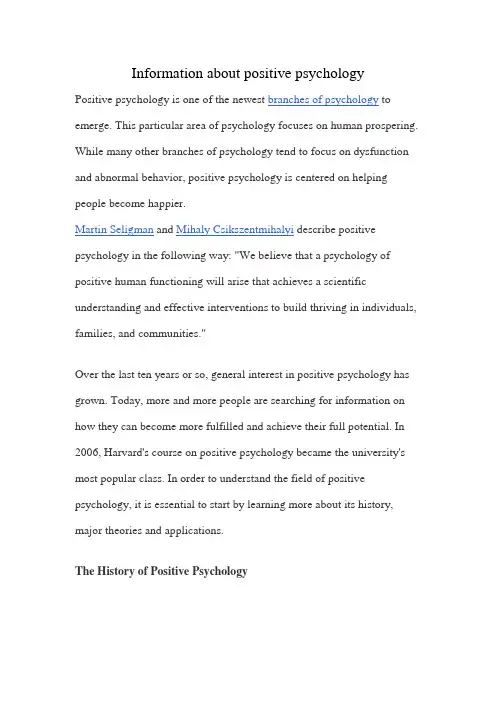
Information about positive psychologyPositive psychology is one of the newest branches of psychology to emerge. This particular area of psychology focuses on human prospering. While many other branches of psychology tend to focus on dysfunction and abnormal behavior, positive psychology is centered on helping people become happier.Martin Seligman and Mihaly Csikszentmihalyi describe positive psychology in the following way: "We believe that a psychology of positive human functioning will arise that achieves a scientific understanding and effective interventions to build thriving in individuals, families, and communities."Over the last ten years or so, general interest in positive psychology has grown. Today, more and more people are searching for information on how they can become more fulfilled and achieve their full potential. In 2006, Harvard's course on positive psychology became the university's most popular class. In order to understand the field of positive psychology, it is essential to start by learning more about its history, major theories and applications.The History of Positive Psychology"Before World War II, psychology had three distinct missions: curing mental illness, making the lives of all people more productive and fulfilling, and identifying and nurturing high talent," Seligman wrote in 2005. Shortly after WWII, the primary focus of psychology shifted to the first priority: treating abnormal behavior and mental illness. During the 1950s, humanist thinkers such as Carl Rogers,Erich Fromm and Abraham Maslow helped renew interest in the other two areas by developing theories that focused on happiness and the positive aspects of human nature.In 1988, Seligman was elected President of the American Psychological Association and positive psychology became the theme of his term. Today, Seligman is widely viewed as the father of contemporary positive psychology. In 2002, the first International Conference on Positive Psychology was held. In 2009, the first World Congress on Positive Psychology took place in Philadelphia and featured talks by Martin Seligman and Philip Zimbardo.Important People in Positive Psychology∙Martin Seligman∙Mihaly Csikszentmihalyi∙Christopher Peterson∙Carol Dweck∙Daniel Gilbert∙Kennon Sheldon∙Albert Bandura∙ C. R. Snyder∙Philip ZimbardoMajor Topics in Positive PsychologySome of the major topics of interest in positive psychology include:∙Happiness∙Optimism and helplessness∙Mindfulness∙Flow∙Character strengths and virtues∙Hope∙Positive thinking∙ResilienceResearch Findings in Positive PsychologySome of the major findings of positive psychology include:∙People are generally happy.∙Money doesn't necessarily buy well-being; but spending money on other people can make individuals happier.∙Some of the best ways to combat disappointments and setbacks include strong social relationships and character strengths.∙Work can be important to well-being, especially when people are able to engage in work that is purposeful and meaningful.∙While happiness is influenced by genetics, people can learn to be happier by developing optimism, gratitude and altruism.Applications of Positive PsychologyPositive psychology can have a range of real-world applications in areas including education, therapy, self-help, stress management and workplace issues. Using strategies from positive psychology, teachers, coaches, therapists and employers can motivate others and help individuals understand and develop their personal strengths.Understanding Positive PsychologyIn a 2008 article published by Psychology Today, Christopher Peterson, author of A Primer in Positive Psychology and professor at the University of Michigan, notes that it is essential to understand what positive psychology is as well as what it is not. "Positive psychology is ... a call for psychological science and practice to be as concerned with strength aswith weakness; as interested in building the best things in life as in repairing the worst; and as concerned with making the lives of normal people fulfilling as with healing pathology," he writes.He cautions, however, that positive psychology does not involve ignoring the very real problems that people face and that other areas of psychology strive to treat. "The value of positive psychology is to complement and extend the problem-focused psychology that has been dominant for many decades," he explains.ReferencesGable, S. & Haidt, J (2005). What (and Why) is Positive Psychology? Review of General Psychology, 9(2),103–110Goldberg, C. (2006). Harvard's crowded course to happiness. Boston Globe. Found online at/news/local/articles/2006/03/10/harvards_crowded_course_to_happiness/Peterson, C. (2006). A Primer in Positive Psychology. New York: Oxford University Press.Peterson, C. (2008). What Is Positive Psychology, and What Is It Not? Psychology Today. Found online at/blog/the-good-life/200805/what-is-positive-psychology-and-what-is-it-not Seligman, M. E. P. & Csikszenmihalyi, M. (2000). Positive psychology: An introduction. American Psychologist, 55, 5-14.。
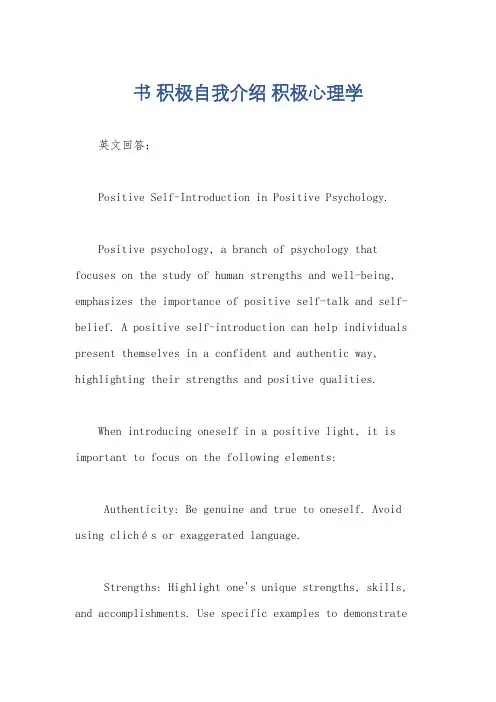
书积极自我介绍积极心理学英文回答:Positive Self-Introduction in Positive Psychology.Positive psychology, a branch of psychology that focuses on the study of human strengths and well-being, emphasizes the importance of positive self-talk and self-belief. A positive self-introduction can help individuals present themselves in a confident and authentic way, highlighting their strengths and positive qualities.When introducing oneself in a positive light, it is important to focus on the following elements:Authenticity: Be genuine and true to oneself. Avoid using clichés or exag gerated language.Strengths: Highlight one's unique strengths, skills, and accomplishments. Use specific examples to demonstratethese qualities.Values: Share personal values and beliefs that align with the context of the introduction.Goals: Express aspirations and goals that align with one's strengths and values.Enthusiasm: Convey genuine enthusiasm and passion for one's work or interests.By incorporating these elements into a positive self-introduction, individuals can create a lasting impression and effectively communicate their strengths and aspirations.中文回答:积极心理学中的积极自我介绍。
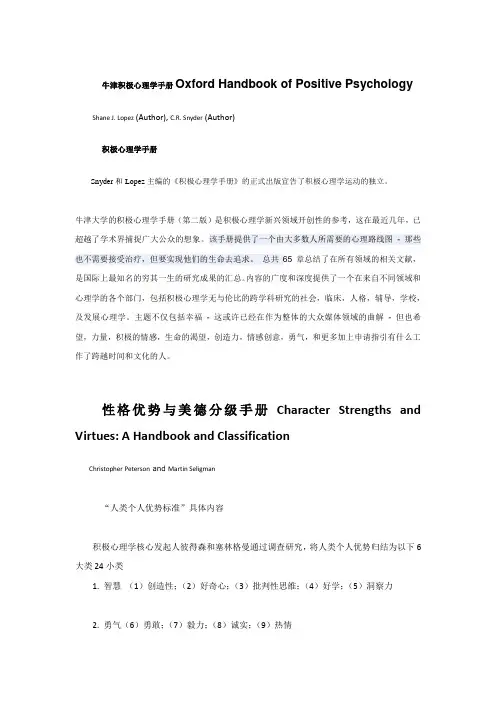
牛津积极心理学手册Oxford Handbook of Positive Psychology Shane J. Lopez (Author), C.R. Snyder (Author)积极心理学手册Snyder和Lopez主编的《积极心理学手册》的正式出版宣告了积极心理学运动的独立。
牛津大学的积极心理学手册(第二版)是积极心理学新兴领域开创性的参考,这在最近几年,已超越了学术界捕捉广大公众的想象。
该手册提供了一个由大多数人所需要的心理路线图- 那些也不需要接受治疗,但要实现他们的生命去追求。
总共65章总结了在所有领域的相关文献,是国际上最知名的穷其一生的研究成果的汇总。
内容的广度和深度提供了一个在来自不同领域和心理学的各个部门,包括积极心理学无与伦比的跨学科研究的社会,临床,人格,辅导,学校,及发展心理学。
主题不仅包括幸福- 这或许已经在作为整体的大众媒体领域的曲解- 但也希望,力量,积极的情感,生命的渴望,创造力,情感创意,勇气,和更多加上申请指引有什么工作了跨越时间和文化的人。
性格优势与美德分级手册Character Strengths and Virtues: A Handbook and ClassificationChristopher Peterson and Martin Seligman“人类个人优势标准”具体内容积极心理学核心发起人彼得森和塞林格曼通过调查研究,将人类个人优势归结为以下6大类24小类1. 智慧(1)创造性;(2)好奇心;(3)批判性思维;(4)好学;(5)洞察力2. 勇气(6)勇敢;(7)毅力;(8)诚实;(9)热情3. 仁爱(10)爱与被爱的能力;(11)善良;(12)社交智慧4. 公正(13)忠诚;(14)公平;(15)领导力5. 节制(16)宽恕;(17)谦虚;(18)谨慎;(19)自制6. 卓越(20)对美的欣赏;(21)感恩;(22)乐观;(23)幽默;(24)灵性对于以上6大类,24项“人类个人优势标准”的具体解释如下:(1)智慧(wisdom and knowledge)—获取知识、运用知识的认知优势。

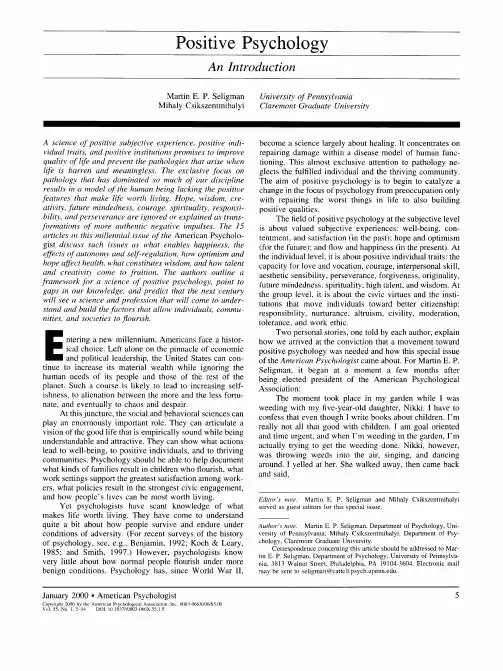
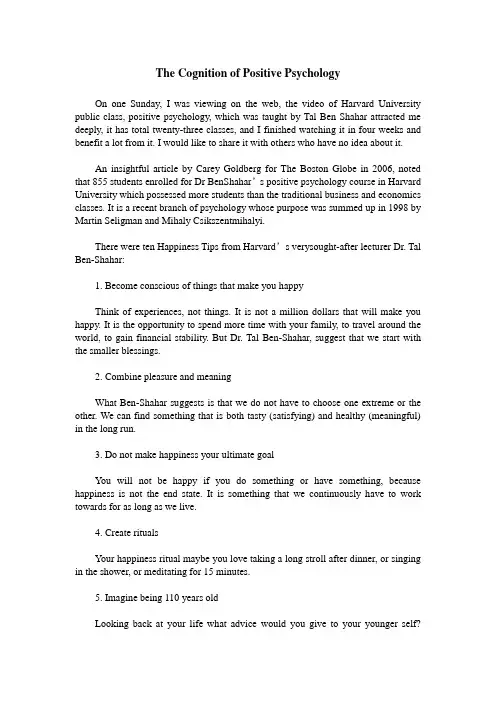
The Cognition of Positive PsychologyOn one Sunday, I was viewing on the web, the video of Harvard University public class, positive psychology, which was taught by Tal Ben Shahar attracted me deeply, it has total twenty-three classes, and I finished watching it in four weeks and benefit a lot from it. I would like to share it with others who have no idea about it.An insightful article by Carey Goldberg for The Boston Globe in 2006, noted that 855 students enrolled for Dr BenShahar’s positive psychology course in Harvard University which possessed more students than the traditional business and economics classes. It is a recent branch of psychology whose purpose was summed up in 1998 by Martin Seligman and Mihaly Csikszentmihalyi.There were ten Happiness Tips from Harvard’s verysought-after lecturer Dr. Tal Ben-Shahar:1. Become conscious of things that make you happyThink of experiences, not things. It is not a million dollars that will make you happy. It is the opportunity to spend more time with your family, to travel around the world, to gain financial stability. But Dr. Tal Ben-Shahar, suggest that we start with the smaller blessings.2. Combine pleasure and meaningWhat Ben-Shahar suggests is that we do not have to choose one extreme or the other. We can find something that is both tasty (satisfying) and healthy (meaningful) in the long run.3. Do not make happiness your ultimate goalYou will not be happy if you do something or have something, because happiness is not the end state. It is something that we continuously have to work towards for as long as we live.4. Create ritualsYour happiness ritual maybe you love taking a long stroll after dinner, or singing in the shower, or meditating for 15 minutes.5. Imagine being 110 years oldLooking back at your life what advice would you give to your younger self?What is the most important lesson of all? What trivial, negative, superficial things are not worth your time and effort? When you look at your everyday life from this perspective many things fall into place.6. Simplify your lifeCommit to decreasing the busy-ness in your life by liberating more time for goals or activities that increase your happiness. Ask yourself, what you can give up or say “no”to? Free your mind from emotional cl utter. Simplify your daily routines.7. Remember about the mind-body connectionIf you want to keep your mind positive and your spirits up, start with getting an adequate amount of sleep, paying attention to your diet and getting regular exercise. Take care of your body!8. Embrace your emotions unhappiness.Not just positive emotions as joy or enthusiasm, but emotions like anger, fear, anxiety or sadness. Do not try to deny or run from them. Expecting to be happy all the time is unrealistic and ultimately impossible. Doing so will only lead to disappointment and greater unhappiness.9. Start with your attitudeExtreme scenarios aside, our happiness is mostly determined by what we choose to focus on and how we decide to interpret external events. If we focus on something that angers, annoys or frustrates us, we will feed this emotion and subconsciously look for other triggers that will make us even angrier and even more frustrated.10. Make happiness your ultimate currencyIt is happiness, not money, connections or social status that should be the currency by which our life ought to be measured. If our days feel meaningless and empty, the question we should ask ourselves is – What are we trading our happiness for? The answer to this holds the key to our life satisfaction and self-development.As a conclusion, Positive psychology seeks “to find and nurture genius and talent”, and “to make normal life more fulfilling”, not simply to treat mental illness. The field is intended to complement, not to replace traditional psychology. It does not seek to deny the importance of studying how things go wrong, but rather to emphasize the importance of using the scientific method to determine how things go right.。

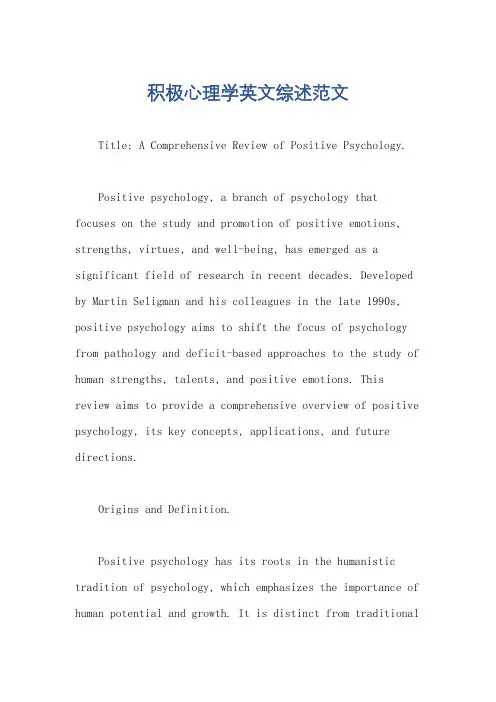
积极心理学英文综述范文Title: A Comprehensive Review of Positive Psychology.Positive psychology, a branch of psychology that focuses on the study and promotion of positive emotions, strengths, virtues, and well-being, has emerged as a significant field of research in recent decades. Developed by Martin Seligman and his colleagues in the late 1990s, positive psychology aims to shift the focus of psychology from pathology and deficit-based approaches to the study of human strengths, talents, and positive emotions. This review aims to provide a comprehensive overview of positive psychology, its key concepts, applications, and future directions.Origins and Definition.Positive psychology has its roots in the humanistic tradition of psychology, which emphasizes the importance of human potential and growth. It is distinct from traditionalpsychology, which has often been focused on studying and treating mental illness and pathology. Positive psychology instead focuses on the positive aspects of human life, including emotions, traits, and institutions that promote well-being and flourishing.The core principles of positive psychology are centered around three key areas: positive emotions, engagement with life, and positive relationships. Positive emotions refer to feelings of happiness, joy, contentment, and other positive affective states. Engagement with life involves being fully present and immersed in activities that are personally meaningful and fulfilling. Positiverelationships refer to the quality and nature of our social connections with others, including family, friends, and community.Applications and Interventions.Positive psychology has a wide range of applications and interventions that aim to promote positive outcomes and enhance well-being. One of the most well-knowninterventions in positive psychology is the practice of gratitude, which involves intentionally focusing on and appreciating the good things in life. Gratitude has been shown to improve emotional well-being,增强人际关系, and enhance overall life satisfaction.Other interventions include mindfulness practices, such as meditation and yoga, which promote awareness and engagement with the present moment. Mindfulness has been found to reduce stress and anxiety, enhance emotional regulation, and improve cognitive performance. Other positive psychology interventions focus on building social connections, fostering positive relationships, and developing character strengths.Future Directions.Positive psychology is a rapidly growing field, and there are many exciting directions for future research and application. One area of particular interest is the development of positive interventions for specific populations, such as adolescents, older adults, andindividuals with mental health conditions. By tailoring interventions to meet the unique needs of these populations, positive psychology has the potential to make significant contributions to improving their well-being and quality of life.Another important direction for future research is the exploration of the neurobiological mechanisms that underlie positive emotions and well-being. By understanding how positive psychology interventions work at theneurobiological level, we can gain a deeper understandingof their effectiveness and develop more targeted andprecise interventions.Conclusion.Positive psychology has emerged as a critical field of research and practice that focuses on the positive aspectsof human life. By studying and promoting positive emotions, strengths, virtues, and well-being, positive psychology has the potential to transform individuals, communities, and society for the better. Future research and applications inpositive psychology will continue to expand our understanding of human potential and growth and lead to more effective interventions that promote positive outcomes and enhance well-being.。
积极心理学品格优势英文Positive psychology is a branch of psychology that focuses on understanding and promoting human well-being and flourishing. It emphasizes the study of positive emotions, character strengths, and positive experiences. One key concept within positive psychology is the notion of character strengths.Character strengths refer to positive traits or qualities that are inherent to individuals and contribute to their personal and social well-being. These strengths are considered to be the core elements of a person's character and are believed to play a crucial role in their overall happiness and success.There are several theories and models that have been developed to identify and classify character strengths. One of the most well-known models is the Values in Action (VIA) classification, which identifies 24 character strengths. Some examples of these strengths include creativity, kindness, perseverance, and gratitude.Research in positive psychology has shown that individuals who are aware of their character strengths and actively utilize them in their daily lives experience higher levels ofwell-being, happiness, and life satisfaction. For example, individuals who frequently express gratitude tend to have a more positive outlook on life and stronger social relationships.Character strengths can be developed and cultivated through various interventions and practices. One such intervention is the practice of mindfulness, which involves intentionally paying attention to the present moment without judgment. Mindfulness has been found to enhance self-awareness and help individuals recognize and utilize their character strengths effectively.In addition to mindfulness, other interventions such as positive affirmations, gratitude exercises, and acts of kindness can also be used to promote the development and utilization of character strengths. These interventions have been shown to improve overall well-being and contribute to a more positive and fulfilling life.To sum up, positive psychology and the concept of character strengths provide a framework for understanding and promoting human flourishing. By focusing on individuals' positive qualities and strengths, positive psychology offers practical strategies for enhancing well-being and living a morefulfilling life.积极心理学是心理学的一个分支,专注于理解和促进人类的幸福和繁荣。
积极心理学英文综述范文English:Positive psychology is a branch of psychology that focuses on the study and promotion of positive emotions, strengths, virtues, and well-being. Developed by Martin Seligman and his colleagues in the late 1990s, positive psychology seeks to understand what makes life worth living and how individuals can thrive. It emphasizes cultivating strengths such as resilience, optimism, gratitude, and mindfulness to enhance overall psychological functioning and satisfaction with life. Rather than solely treating mental illness, positive psychology aims to foster human flourishing by identifying and nurturing positive aspects of human experience. Research in this field encompasses various domains including positive emotions, positive traits, positive relationships, and positive institutions. Positive psychology interventions, such as gratitude journaling, mindfulness meditation, and strengths-based coaching, have been shown to effectively enhance well-being and reduce symptoms of depression and anxiety. By promoting a strengths-based approach and focusing on personal growth and fulfillment, positive psychology offers valuable insightsinto enhancing the quality of life and promoting resilience in individuals and communities.中文翻译:积极心理学是心理学的一个分支,专注于研究和促进积极情绪、优势、美德和幸福感。
传递积极心理信念英文作文英文:Positive psychology is a powerful tool that can help us overcome challenges and achieve our goals. It involves cultivating a mindset that focuses on our strengths and abilities, rather than our weaknesses and limitations. By doing so, we can increase our resilience, motivation, and happiness.One way to cultivate a positive mindset is to practice gratitude. This means focusing on the things in our lives that we are thankful for, rather than dwelling on thethings that we lack. For example, instead of feelingenvious of someone else's success, we can be grateful forthe opportunities we have had and the progress we have made.Another way to cultivate a positive mindset is to reframe our negative thoughts. Instead of thinking "I can't do this," we can reframe it to "I haven't learned how to dothis yet, but I can learn." This helps us to see challenges as opportunities for growth and learning, rather than as insurmountable obstacles.Finally, it is important to surround ourselves with positive influences. This can include supportive friends and family members, inspiring role models, and uplifting media. By surrounding ourselves with positivity, we can reinforce our own positive mindset and stay motivated to achieve our goals.中文:积极心理学是一种强大的工具,可以帮助我们克服挑战,实现目标。
积极心理品质英文Positive Psychological QualitiesEmbracing a positive mindset is a fundamental aspect of personal growth and well-being. Cultivating positive psychological qualities can have a profound impact on our lives, enabling us to navigate challenges, foster meaningful relationships, and unlock our full potential. In this essay, we will explore some of the key positive psychological qualities and their significance in our personal and professional lives.One of the most essential positive psychological qualities is resilience. Resilience is the ability to bounce back from adversity, adapt to change, and overcome obstacles. Individuals with a high level of resilience possess an innate ability to cope with stress, learn from setbacks, and maintain a positive outlook even in the face of adversity. Resilience is not about avoiding or eliminating challenges but rather about developing the skills and mindset to navigate them effectively. By fostering resilience, we can develop a greater capacity to withstand life's ups and downs, and emerge from difficult situations stronger and more equipped to tackle future challenges.Another crucial positive psychological quality is optimism. Optimism is the tendency to expect positive outcomes and focus on the brighter side of life. Optimistic individuals are more likely to see opportunities rather than obstacles, and are more inclined to take action towards their goals. Optimism has been linked to a range of positive outcomes, including better physical and mental health, stronger relationships, and increased perseverance in the face of challenges. By cultivating an optimistic mindset, we can enhance our overall well-being, boost our motivation, and approach life's challenges with a sense of hope and possibility.Closely related to optimism is the quality of hope. Hope is the belief that positive change is possible and that we have the ability to influence our own future. Individuals with a strong sense of hope are more likely to set and pursue meaningful goals, and to maintain a positive outlook even in the face of setbacks. Hope is a powerful force that can inspire us to take action, overcome obstacles, and ultimately achieve our desired outcomes. By fostering hope, we can develop a greater sense of agency and control over our lives, and approach the future with a sense of purpose and determination.Another important positive psychological quality is gratitude. Gratitude is the practice of acknowledging and appreciating the positive aspects of our lives, including the people, experiences, and opportunities we have been blessed with. Individuals who cultivategratitude tend to have a more positive outlook on life, experience higher levels of life satisfaction, and develop stronger social connections. Expressing gratitude can also have a profound impact on our mental and physical health, as it has been linked to reduced stress, improved sleep, and increased feelings of well-being. By regularly practicing gratitude, we can shift our focus away from what we lack and instead appreciate the abundance that already exists in our lives.Closely related to gratitude is the quality of mindfulness. Mindfulness is the practice of being fully present and engaged in the current moment, without judgment or attachment to the past or future. Mindful individuals are better equipped to manage stress, regulate their emotions, and maintain a clear and focused mind. Mindfulness has been shown to enhance cognitive function, improve decision-making, and foster a greater sense of overall well-being. By cultivating mindfulness, we can develop a greater awareness of our thoughts, feelings, and behaviors, and respond to life's challenges with greater clarity and equanimity.Another positive psychological quality that is crucial for personal growth and success is self-compassion. Self-compassion is the ability to treat oneself with kindness, understanding, and acceptance, even in the face of failure or perceived shortcomings. Individuals who practice self-compassion are less likely to engage in self-criticismand more likely to approach challenges with a nurturing and supportive attitude. Self-compassion has been linked to a range of positive outcomes, including improved mental health, stronger relationships, and greater resilience in the face of adversity. By cultivating self-compassion, we can develop a more positive and supportive relationship with ourselves, which can in turn enhance our overall well-being and ability to navigate life's challenges.Finally, one of the most important positive psychological qualities is a sense of purpose. A sense of purpose is the belief that our lives have meaning and that we are working towards something greater than ourselves. Individuals with a strong sense of purpose tend to have a greater sense of direction, motivation, and overall life satisfaction. Purpose can be found in a wide range of domains, from our work and hobbies to our relationships and community involvement. By cultivating a sense of purpose, we can develop a greater sense of meaning and fulfillment in our lives, and approach our goals and aspirations with a greater sense of passion and commitment.In conclusion, the cultivation of positive psychological qualities is essential for personal growth, well-being, and success. By embracing qualities such as resilience, optimism, hope, gratitude, mindfulness, self-compassion, and a sense of purpose, we can develop a more positive and empowered mindset that enables us to navigate life'schallenges with greater ease and effectiveness. Through the consistent practice and development of these qualities, we can unlock our full potential, deepen our relationships, and contribute positively to the world around us.。
The Psychology of Positive Psychology Positive psychology is a relatively new field of psychology that has gained a lot of attention in recent years. It is a branch of psychology that focuses on the positive aspects of human behavior and how they can be enhanced to improve well-being and quality of life. Positive psychology is a science that is concerned with understanding how people can lead fulfilling and meaningful lives, and how they can achieve their full potential.One of the key concepts in positive psychology is the idea of resilience. Resilience is the ability to bounce back from adversity and to adapt to change. It is a crucial skill that can help people to overcome challenges and to thrive in difficult circumstances. Resilience is not something that people are born with; it can be developed through practice and training.Another important concept in positive psychology is the idea of positive emotions. Positive emotions are emotions that make people feel good, such as happiness, joy, and contentment. Research has shown that positive emotions can have a range of benefits, including improved physical health, increased creativity, and better social relationships. Positive emotions can be cultivated through a range of activities, such as meditation, mindfulness, and gratitude practices.Positive psychology also emphasizes the importance of relationships and social connections. Research has shown that people who have strong social connections are happier, healthier, and more resilient than those who are socially isolated. Positive psychology encourages people to build and maintain strong relationships with family, friends, and colleagues, and to participate in social activities that bring them joy and fulfillment.Another important aspect of positive psychology is the idea of personal growth and development. Positive psychology encourages people to set goals and to work towards achieving them. It emphasizes the importance of self-reflection and self-awareness, and encourages people to identify their strengths and weaknesses and to work on developing their skills and abilities. Positive psychology also encourages people to seek out newexperiences and challenges, and to embrace opportunities for personal growth and development.Finally, positive psychology emphasizes the importance of meaning and purpose in life. Research has shown that people who have a sense of meaning and purpose in life are happier, healthier, and more resilient than those who do not. Positive psychology encourages people to identify their values and to work towards goals that are aligned with those values. It also encourages people to find meaning and purpose in their work, their relationships, and their hobbies and interests.In conclusion, positive psychology is a fascinating and important field of psychology that has a lot to offer in terms of improving well-being and quality of life. It emphasizes the importance of resilience, positive emotions, relationships, personal growth and development, and meaning and purpose in life. By focusing on these key concepts, positive psychology can help people to lead happier, healthier, and more fulfilling lives.。
积极心理学英语作文Positive psychology is a field of study that focuses on the strengths and virtues that enable individuals and communities to thrive. It is a relatively new branch of psychology, developed in the late 20th century by Martin Seligman and Mihaly Csikszentmihalyi. Positive psychology seeks to shift the focus oftraditional psychology from treating mental illness to promoting mental well-being and happiness. One of the key concepts in positive psychology is the idea of positive emotions. Emotions such as joy, gratitude, and hope have been found to have a significant impact on an individual's overall well-being. By cultivating these positive emotions, individuals can improve their mental and physical health, as well as their relationships with others. This focus on positive emotions hasled to the development of interventions and therapies aimed at increasing positive emotions in individuals. Another important aspect of positive psychology is the study of character strengths and virtues. Researchers in this field haveidentified a set of core virtues, such as wisdom, courage, and humanity, as wellas a number of character strengths, such as creativity, perseverance, and kindness. By identifying and cultivating these strengths in individuals, positive psychologists aim to help people lead more fulfilling and meaningful lives. In addition to focusing on individual well-being, positive psychology also looks at the broader concept of flourishing communities and societies. Researchers in this field study the factors that contribute to the well-being of communities, such as social connectedness, civic engagement, and a sense of purpose. By understanding these factors, positive psychologists seek to promote the development of communities that are supportive, inclusive, and thriving. One of the criticismsof positive psychology is that it can be overly focused on the positive aspects of life, to the exclusion of negative emotions and experiences. Some argue that this focus on positivity can be unrealistic and even harmful, as it may leadindividuals to ignore or suppress negative emotions, rather than addressing themin a healthy way. Critics also point out that the emphasis on individual happiness and well-being can detract from the larger social and political factors that contribute to overall well-being. Despite these criticisms, positive psychology has had a significant impact on the field of psychology and on society as a whole.It has led to the development of interventions and therapies that have been shown to improve mental health and well-being, and it has sparked a broader cultural conversation about the importance of happiness and flourishing. By focusing on the positive aspects of human experience, positive psychology has the potential to help individuals, communities, and societies thrive.。
The original of positive psychology must date back to the humanistic psychology in the 20th century, which focused heavily on happiness and fulfillment. (As scientific psychology did not take its modern form until the late 19th century) Philosophy and religious sources have influence on positivity. Socrates advocated self-knowledge as the path to happiness. Plato believed that happiness is found by finding deeper meaning. Aristotle had the idea that happiness is constituted by rational activity in accordance with virtue over a complete life. The first positive psychology summit and the First International Conference on Positive Psychology took place in 1999 and in 2002. Since then, more attention was given by the general public
As a positive branch of psychology, the definition of positive psychology is make psychology investigate and promote realistic ways of fostering more joy in individuals and communities. Its purpose is to achieve a scientific understanding and effective interventions, building thriving individuals, families, and communities and making normal life more fulfilling, rather than merely treating mental illness.Positive psychology is primarily concerned with using the psychological theory, research and intervention techniques to understand the positive, adaptive, creative and emotionally fulfilling aspects of human behavior. Its goal is to help people change negative styles of thinking as a way to change how they feel. Positive psychologists are concerned with four topics: (1) positive experiences, (2) enduring psychological traits, (3) positive relationships and (4) positive institutions. [8]
In positive psychology, there are many factors involve in happiness, such as age, gender, personal finances, education, intelligence, parenthood, marriage, personality, social ties, weather, religion culture, political views and suffering.
It helps people complete mental health which is a combination of high emotional well-being, high psychological well-being, and high social well-being, along with low mental illness. Using your signature strengths every day to produce authentic happiness and abundant gratification is a kind of positive thinking mentioned in the positive psychology.
Overall general, positive psychology creates a bridge between Ivory and main street, contributing a well-lived and fulfilling life.。